afterLoad (456.31KB) (4.51ms)
afterInitialise (1.27MB) (40.65ms)
afterRoute (870.39KB) (23.8ms)
beforeRenderComponent com_tags (20.85KB) (1.8ms)
afterRenderComponent com_tags (2.25MB) (123ms)
afterDispatch (27.05KB) (2.87ms)
beforeRenderRawModule mod_articles_category (READ MORE...) (372.12KB) (7.61ms)
Before Access::preloadComponents (all components) (56.7KB) (458μs)
After Access::preloadComponents (all components) (103.05KB) (1.61ms)
Before Access::getAssetRules (id:8 name:com_content) (840B) (18μs)
After Access::getAssetRules (id:8 name:com_content) (7.05KB) (46μs)
afterRenderRawModule mod_articles_category (READ MORE...) (5.08KB) (65.4ms)
beforeRenderRawModule mod_tags_popular (Search) (4.81KB) (31μs)
afterRenderRawModule mod_tags_popular (Search) (7.26KB) (50.8ms)
beforeRenderRawModule mod_custom (Remember to download Heart Healthy Seniors) (816B) (30μs)
afterRenderRawModule mod_custom (Remember to download Heart Healthy Seniors) (4.86KB) (235μs)
beforeRenderRawModule mod_custom (Get additionel and more detailed knowledge ) (752B) (14μs)
afterRenderRawModule mod_custom (Get additionel and more detailed knowledge ) (1.67KB) (28μs)
beforeRenderRawModule mod_custom (BOOST YOUR IMMUNE DEFENSE) (608B) (10μs)
afterRenderRawModule mod_custom (BOOST YOUR IMMUNE DEFENSE) (928B) (21μs)
beforeRenderRawModule mod_custom (Are you taking supplements) (736B) (9μs)
afterRenderRawModule mod_custom (Are you taking supplements) (1.03KB) (19μs)
beforeRenderRawModule mod_custom (Antiaging) (720B) (9μs)
afterRenderRawModule mod_custom (Antiaging) (1.02KB) (18μs)
beforeRenderRawModule mod_custom (Exercise) (720B) (9μs)
afterRenderRawModule mod_custom (Exercise) (1.02KB) (17μs)
beforeRenderRawModule mod_custom (Check this before you buy a Q10 product) (752B) (9μs)
afterRenderRawModule mod_custom (Check this before you buy a Q10 product) (944B) (18μs)
beforeRenderRawModule mod_custom (Chronic fatigue tied Alan to his bed but Q10 capsules saved him:) (245.53KB) (5.09ms)
afterRenderRawModule mod_custom (Chronic fatigue tied Alan to his bed but Q10 capsules saved him:) (960B) (46μs)
beforeRenderModule mod_custom (Chronic fatigue tied Alan to his bed but Q10 capsules saved him:) (768B) (5μs)
afterRenderModule mod_custom (Chronic fatigue tied Alan to his bed but Q10 capsules saved him:) (1.3KB) (65μs)
beforeRenderRawModule mod_custom (Cholesterol-lowering without side effects:) (368B) (12μs)
afterRenderRawModule mod_custom (Cholesterol-lowering without side effects:) (2.19KB) (25μs)
beforeRenderModule mod_custom (Cholesterol-lowering without side effects:) (752B) (2μs)
afterRenderModule mod_custom (Cholesterol-lowering without side effects:) (1.28KB) (32μs)
beforeRenderModule mod_articles_category (READ MORE...) (21.32KB) (328μs)
afterRenderModule mod_articles_category (READ MORE...) (1.25KB) (40μs)
beforeRenderModule mod_tags_popular (Search) (5.17KB) (13μs)
afterRenderModule mod_tags_popular (Search) (1.27KB) (25μs)
beforeRenderModule mod_custom (Remember to download Heart Healthy Seniors) (1.17KB) (11μs)
afterRenderModule mod_custom (Remember to download Heart Healthy Seniors) (1.3KB) (23μs)
beforeRenderModule mod_custom (Get additionel and more detailed knowledge ) (368B) (9μs)
afterRenderModule mod_custom (Get additionel and more detailed knowledge ) (1.3KB) (21μs)
beforeRenderModule mod_custom (BOOST YOUR IMMUNE DEFENSE) (224B) (9μs)
afterRenderModule mod_custom (BOOST YOUR IMMUNE DEFENSE) (1.28KB) (21μs)
beforeRenderModule mod_custom (Are you taking supplements) (352B) (1.02ms)
afterRenderModule mod_custom (Are you taking supplements) (1.28KB) (33μs)
beforeRenderModule mod_custom (Antiaging) (336B) (11μs)
afterRenderModule mod_custom (Antiaging) (1.27KB) (23μs)
beforeRenderModule mod_custom (Exercise) (336B) (9μs)
afterRenderModule mod_custom (Exercise) (1.25KB) (21μs)
beforeRenderModule mod_custom (Check this before you buy a Q10 product) (352B) (9μs)
afterRenderModule mod_custom (Check this before you buy a Q10 product) (1.28KB) (31μs)
beforeRenderRawModule mod_menu (Main menu-US) (20.94KB) (518μs)
afterRenderRawModule mod_menu (Main menu-US) (152.66KB) (3.49ms)
beforeRenderModule mod_menu (Main menu-US) (720B) (5μs)
afterRenderModule mod_menu (Main menu-US) (4.36KB) (66μs)
beforeRenderRawModule mod_languages (Sprogskift) (3.44KB) (18μs)
afterRenderRawModule mod_languages (Sprogskift) (90.8KB) (1.63ms)
beforeRenderModule mod_languages (Sprogskift) (720B) (6μs)
afterRenderModule mod_languages (Sprogskift) (5.31KB) (20μs)
beforeRenderRawModule mod_finder () (6.34KB) (11μs)
afterRenderRawModule mod_finder () (150.16KB) (4.7ms)
beforeRenderModule mod_finder () (704B) (5μs)
afterRenderModule mod_finder () (5.79KB) (34μs)
beforeRenderRawModule mod_custom () (6.62KB) (148μs)
afterRenderRawModule mod_custom () (22.66KB) (2.65ms)
beforeRenderModule mod_custom () (704B) (5μs)
afterRenderModule mod_custom () (1.23KB) (56μs)
beforeRenderRawModule mod_menu (Main menu-US) (5.07KB) (103μs)
afterRenderRawModule mod_menu (Main menu-US) (5.8KB) (1.24ms)
beforeRenderModule mod_menu (Main menu-US) (720B) (4μs)
afterRenderModule mod_menu (Main menu-US) (1.25KB) (52μs)
beforeRenderRawModule mod_languages (Sprogskift Mobil) (912B) (17μs)
afterRenderRawModule mod_languages (Sprogskift Mobil) (3.89KB) (669μs)
beforeRenderModule mod_languages (Sprogskift Mobil) (720B) (4μs)
afterRenderModule mod_languages (Sprogskift Mobil) (1.27KB) (33μs)
beforeRenderRawModule mod_finder () (2.3KB) (10μs)
afterRenderRawModule mod_finder () (6.29KB) (1.72ms)
beforeRenderModule mod_finder () (704B) (5μs)
afterRenderModule mod_finder () (1.23KB) (51μs)
beforeRenderRawModule mod_custom () (8.66KB) (182μs)
afterRenderRawModule mod_custom () (904B) (139μs)
beforeRenderModule mod_custom () (704B) (3μs)
afterRenderModule mod_custom () (2.43KB) (25μs)
beforeRenderRawModule mod_custom () (688B) (81μs)
afterRenderRawModule mod_custom () (896B) (95μs)
beforeRenderModule mod_custom () (704B) (3μs)
afterRenderModule mod_custom () (2.71KB) (21μs)
afterRender (384.21KB) (10.11ms)
| 1 x afterRenderComponent com_tags (2.25MB) (34.1%) | 123.13ms |
| 1 x afterRenderRawModule mod_articles_category (READ MORE...) (5.08KB) (18.11%) | 65.40ms |
| 1 x afterRenderRawModule mod_tags_popular (Search) (7.26KB) (14.07%) | 50.80ms |
| 1 x afterInitialise (1.27MB) (11.26%) | 40.65ms |
| 1 x afterRoute (870.39KB) (6.59%) | 23.80ms |
| 1 x afterRender (384.21KB) (2.8%) | 10.11ms |
| 1 x beforeRenderRawModule mod_articles_category (READ MORE...) (372.12KB) (2.11%) | 7.61ms |
| 1 x beforeRenderRawModule mod_custom (Chronic fatigue tied Alan to his bed but Q10 capsules saved him:) (245.53KB) (1.41%) | 5.09ms |
| 1 x afterRenderRawModule mod_finder () (150.16KB) (1.3%) | 4.70ms |
| 1 x afterLoad (456.31KB) (1.25%) | 4.51ms |
| 1 x afterRenderRawModule mod_menu (Main menu-US) (152.66KB) (0.97%) | 3.49ms |
| 1 x afterDispatch (27.05KB) (0.8%) | 2.87ms |
| 1 x afterRenderRawModule mod_custom () (22.66KB) (0.73%) | 2.65ms |
| 1 x beforeRenderComponent com_tags (20.85KB) (0.5%) | 1.80ms |
| 1 x afterRenderRawModule mod_finder () (6.29KB) (0.48%) | 1.72ms |
| 1 x afterRenderRawModule mod_languages (Sprogskift) (90.8KB) (0.45%) | 1.63ms |
| 1 x After Access::preloadComponents (all components) (103.05KB) (0.45%) | 1.61ms |
| 1 x afterRenderRawModule mod_menu (Main menu-US) (5.8KB) (0.34%) | 1.24ms |
| 1 x beforeRenderModule mod_custom (Are you taking supplements) (352B) (0.28%) | 1.02ms |
| 1 x afterRenderRawModule mod_languages (Sprogskift Mobil) (3.89KB) (0.19%) | 669μs |
| 1 x beforeRenderRawModule mod_menu (Main menu-US) (20.94KB) (0.14%) | 518μs |
| 1 x Before Access::preloadComponents (all components) (56.7KB) (0.13%) | 458μs |
| 1 x beforeRenderModule mod_articles_category (READ MORE...) (21.32KB) (0.09%) | 328μs |
| 1 x afterRenderRawModule mod_custom (Remember to download Heart Healthy Seniors) (4.86KB) (0.07%) | 235μs |
| 1 x beforeRenderRawModule mod_custom () (8.66KB) (0.05%) | 182μs |
| 1 x beforeRenderRawModule mod_custom () (6.62KB) (0.04%) | 148μs |
| 1 x afterRenderRawModule mod_custom () (904B) (0.04%) | 139μs |
| 1 x beforeRenderRawModule mod_menu (Main menu-US) (5.07KB) (0.03%) | 103μs |
| 1 x afterRenderRawModule mod_custom () (896B) (0.03%) | 95μs |
| 1 x beforeRenderRawModule mod_custom () (688B) (0.02%) | 81μs |
| 1 x afterRenderModule mod_menu (Main menu-US) (4.36KB) (0.02%) | 66μs |
| 1 x afterRenderModule mod_custom (Chronic fatigue tied Alan to his bed but Q10 capsules saved him:) (1.3KB) (0.02%) | 65μs |
| 1 x afterRenderModule mod_custom () (1.23KB) (0.02%) | 56μs |
| 1 x afterRenderModule mod_menu (Main menu-US) (1.25KB) (0.01%) | 52μs |
| 1 x afterRenderModule mod_finder () (1.23KB) (0.01%) | 51μs |
| 1 x After Access::getAssetRules (id:8 name:com_content) (7.05KB) (0.01%) | 46μs |
| 1 x afterRenderRawModule mod_custom (Chronic fatigue tied Alan to his bed but Q10 capsules saved him:) (960B) (0.01%) | 46μs |
| 1 x afterRenderModule mod_articles_category (READ MORE...) (1.25KB) (0.01%) | 40μs |
| 1 x afterRenderModule mod_finder () (5.79KB) (0.01%) | 34μs |
| 1 x afterRenderModule mod_languages (Sprogskift Mobil) (1.27KB) (0.01%) | 33μs |
| 1 x afterRenderModule mod_custom (Are you taking supplements) (1.28KB) (0.01%) | 33μs |
| 1 x afterRenderModule mod_custom (Cholesterol-lowering without side effects:) (1.28KB) (0.01%) | 32μs |
| 1 x beforeRenderRawModule mod_tags_popular (Search) (4.81KB) (0.01%) | 31μs |
| 1 x afterRenderModule mod_custom (Check this before you buy a Q10 product) (1.28KB) (0.01%) | 31μs |
| 1 x beforeRenderRawModule mod_custom (Remember to download Heart Healthy Seniors) (816B) (0.01%) | 30μs |
| 1 x afterRenderRawModule mod_custom (Get additionel and more detailed knowledge ) (1.67KB) (0.01%) | 28μs |
| 1 x afterRenderModule mod_tags_popular (Search) (1.27KB) (0.01%) | 25μs |
| 1 x afterRenderModule mod_custom () (2.43KB) (0.01%) | 25μs |
| 1 x afterRenderRawModule mod_custom (Cholesterol-lowering without side effects:) (2.19KB) (0.01%) | 25μs |
| 1 x afterRenderModule mod_custom (Remember to download Heart Healthy Seniors) (1.3KB) (0.01%) | 23μs |
| 1 x afterRenderModule mod_custom (Antiaging) (1.27KB) (0.01%) | 23μs |
| 1 x afterRenderRawModule mod_custom (BOOST YOUR IMMUNE DEFENSE) (928B) (0.01%) | 21μs |
| 1 x afterRenderModule mod_custom (Get additionel and more detailed knowledge ) (1.3KB) (0.01%) | 21μs |
| 1 x afterRenderModule mod_custom (BOOST YOUR IMMUNE DEFENSE) (1.28KB) (0.01%) | 21μs |
| 1 x afterRenderModule mod_custom (Exercise) (1.25KB) (0.01%) | 21μs |
| 1 x afterRenderModule mod_custom () (2.71KB) (0.01%) | 21μs |
| 1 x afterRenderModule mod_languages (Sprogskift) (5.31KB) (0.01%) | 20μs |
| 1 x afterRenderRawModule mod_custom (Are you taking supplements) (1.03KB) (0.01%) | 19μs |
| 1 x Before Access::getAssetRules (id:8 name:com_content) (840B) (0.01%) | 18μs |
| 1 x afterRenderRawModule mod_custom (Antiaging) (1.02KB) (0.01%) | 18μs |
| 1 x afterRenderRawModule mod_custom (Check this before you buy a Q10 product) (944B) (0.01%) | 18μs |
| 1 x beforeRenderRawModule mod_languages (Sprogskift) (3.44KB) (0.01%) | 18μs |
| 1 x afterRenderRawModule mod_custom (Exercise) (1.02KB) (0%) | 17μs |
| 1 x beforeRenderRawModule mod_languages (Sprogskift Mobil) (912B) (0%) | 17μs |
| 1 x beforeRenderRawModule mod_custom (Get additionel and more detailed knowledge ) (752B) (0%) | 14μs |
| 1 x beforeRenderModule mod_tags_popular (Search) (5.17KB) (0%) | 13μs |
| 1 x beforeRenderRawModule mod_custom (Cholesterol-lowering without side effects:) (368B) (0%) | 12μs |
| 1 x beforeRenderModule mod_custom (Antiaging) (336B) (0%) | 11μs |
| 1 x beforeRenderModule mod_custom (Remember to download Heart Healthy Seniors) (1.17KB) (0%) | 11μs |
| 1 x beforeRenderRawModule mod_finder () (6.34KB) (0%) | 11μs |
| 3 x beforeRenderModule mod_custom () (704B) (0%) | 11μs |
| 1 x beforeRenderRawModule mod_custom (BOOST YOUR IMMUNE DEFENSE) (608B) (0%) | 10μs |
| 2 x beforeRenderModule mod_finder () (704B) (0%) | 10μs |
| 1 x beforeRenderRawModule mod_finder () (2.3KB) (0%) | 10μs |
| 1 x beforeRenderRawModule mod_custom (Are you taking supplements) (736B) (0%) | 9μs |
| 1 x beforeRenderRawModule mod_custom (Antiaging) (720B) (0%) | 9μs |
| 1 x beforeRenderModule mod_custom (BOOST YOUR IMMUNE DEFENSE) (224B) (0%) | 9μs |
| 1 x beforeRenderModule mod_custom (Exercise) (336B) (0%) | 9μs |
| 1 x beforeRenderModule mod_custom (Check this before you buy a Q10 product) (352B) (0%) | 9μs |
| 2 x beforeRenderModule mod_menu (Main menu-US) (720B) (0%) | 9μs |
| 1 x beforeRenderRawModule mod_custom (Exercise) (720B) (0%) | 9μs |
| 1 x beforeRenderRawModule mod_custom (Check this before you buy a Q10 product) (752B) (0%) | 9μs |
| 1 x beforeRenderModule mod_custom (Get additionel and more detailed knowledge ) (368B) (0%) | 9μs |
| 1 x beforeRenderModule mod_languages (Sprogskift) (720B) (0%) | 6μs |
| 1 x beforeRenderModule mod_custom (Chronic fatigue tied Alan to his bed but Q10 capsules saved him:) (768B) (0%) | 5μs |
| 1 x beforeRenderModule mod_languages (Sprogskift Mobil) (720B) (0%) | 4μs |
| 1 x beforeRenderModule mod_custom (Cholesterol-lowering without side effects:) (752B) (0%) | 2μs |
 Lack of vitamin B12 can cause pernicious anemia, which WHO considers a global threat. Vitamin B12 is primarily known for its role in red blood cell formation, whereas its role in the brain and nervous system is often overlooked. A vitamin B12 deficiency can easily lead to disabling damage if it goes unnoticed. Pernicious anemia is an autoimmune disease that prevents people from absorbing vitamin B12 from food. The condition is potentially life-threatening but is difficult to diagnose and many people go untreated, according to Associate Professor Heidi Seage, who is affiliated with the Pernicious Anaemia Society. A worsening factor is the climate debate that has inspired an increasing number of people to turn to vegetarianism and veganism. Plant-based diets are known to cause vitamin B12 deficiency, and the problem is insidious and therefore not easy to detect. The use of diabetes medication (such as metformin) can also deplete the body’s levels of vitamin B12
Lack of vitamin B12 can cause pernicious anemia, which WHO considers a global threat. Vitamin B12 is primarily known for its role in red blood cell formation, whereas its role in the brain and nervous system is often overlooked. A vitamin B12 deficiency can easily lead to disabling damage if it goes unnoticed. Pernicious anemia is an autoimmune disease that prevents people from absorbing vitamin B12 from food. The condition is potentially life-threatening but is difficult to diagnose and many people go untreated, according to Associate Professor Heidi Seage, who is affiliated with the Pernicious Anaemia Society. A worsening factor is the climate debate that has inspired an increasing number of people to turn to vegetarianism and veganism. Plant-based diets are known to cause vitamin B12 deficiency, and the problem is insidious and therefore not easy to detect. The use of diabetes medication (such as metformin) can also deplete the body’s levels of vitamin B12








 Veganism is on the rise, and experts have different views on whether or not plant-diets are suited for children. A team of Polish scientists has now discovered that children on vegan diets have low stature and lower bone density than children who eat meat and dairy products. Children on vegan diets also are also more likely to lack amino acids, vitamin B12, vitamin D, vitamin A, iron, selenium, iodine, and the omega-3 fatty acid DHA (docosahexaenoic acid). It is particularly important for growing children to get enough nutrients to support their muscles, bones, brain, and a variety of enzyme processes. Also, children on vegan diets should be given relevant supplements to compensate for their shortcomings.
Veganism is on the rise, and experts have different views on whether or not plant-diets are suited for children. A team of Polish scientists has now discovered that children on vegan diets have low stature and lower bone density than children who eat meat and dairy products. Children on vegan diets also are also more likely to lack amino acids, vitamin B12, vitamin D, vitamin A, iron, selenium, iodine, and the omega-3 fatty acid DHA (docosahexaenoic acid). It is particularly important for growing children to get enough nutrients to support their muscles, bones, brain, and a variety of enzyme processes. Also, children on vegan diets should be given relevant supplements to compensate for their shortcomings. We all need loads of energy to help us through the day feeling on top of the world. Needless to say, this requires stable blood sugar levels, daylight, exercise, and a good night’s sleep. But what are the energy-providing substances in our food? And why are Q10 and particular vitamins and minerals so essential for our energy metabolism and our physical and mental well-being? An article recently published in Medical News Today looks at this and explains that being deficient of a single nutrient can affect our metabolism, energy levels, and weight regulation. Luckily, this can be compensated for so we get the necessary energy boost.
We all need loads of energy to help us through the day feeling on top of the world. Needless to say, this requires stable blood sugar levels, daylight, exercise, and a good night’s sleep. But what are the energy-providing substances in our food? And why are Q10 and particular vitamins and minerals so essential for our energy metabolism and our physical and mental well-being? An article recently published in Medical News Today looks at this and explains that being deficient of a single nutrient can affect our metabolism, energy levels, and weight regulation. Luckily, this can be compensated for so we get the necessary energy boost.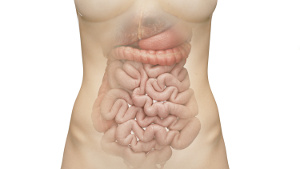 All the different B vitamins are of vital importance to our energy levels, nervous system, skin, hair, and health in general. Our daily diet is the primary source of the vitamins but the intestinal flora is able to synthesize, consume, and compete for vitamin B in the host. Interactions between the body and the gut flora is therefore important for how we absorb and utilize the different B vitamins. On the other hand, lack of B vitamins or supplementation with B vitamins can also affect our gut flora, according to a review article that is published in Frontiers in Nutrition.
All the different B vitamins are of vital importance to our energy levels, nervous system, skin, hair, and health in general. Our daily diet is the primary source of the vitamins but the intestinal flora is able to synthesize, consume, and compete for vitamin B in the host. Interactions between the body and the gut flora is therefore important for how we absorb and utilize the different B vitamins. On the other hand, lack of B vitamins or supplementation with B vitamins can also affect our gut flora, according to a review article that is published in Frontiers in Nutrition.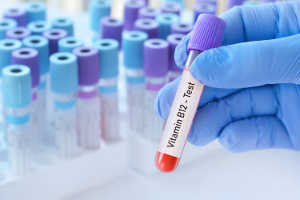 Lack of vitamin B12 and folic acid increases the risk of Alzheimer’s disease, which is because these B vitamins regulate blood levels of homocysteine that must be below a certain threshold. Apparently, men and women react differently to B vitamins and folic acid with regard to cognitive functions, according to a study that is published in Nutrients. The risk of developing Alzheimer’s disease is also lower among younger people and among those who drink tea or coffee. Unfortunately, many older people lack these particular B vitamins because of poor diet habits, low stomach acid, or the use of various medical drugs.
Lack of vitamin B12 and folic acid increases the risk of Alzheimer’s disease, which is because these B vitamins regulate blood levels of homocysteine that must be below a certain threshold. Apparently, men and women react differently to B vitamins and folic acid with regard to cognitive functions, according to a study that is published in Nutrients. The risk of developing Alzheimer’s disease is also lower among younger people and among those who drink tea or coffee. Unfortunately, many older people lack these particular B vitamins because of poor diet habits, low stomach acid, or the use of various medical drugs.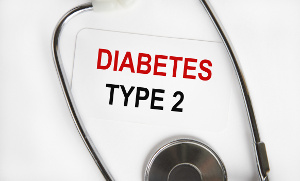 Type 2 diabetes is spreading like a bushfire. An alarmingly many people have metabolic syndrome – or pre-diabetes – which is characterized by insulin resistance, hypertension, elevated cholesterol levels and abdominal obesity (apple-shaped body). Type 2 diabetes and metabolic syndrome are associated with enormous human and socio-economic costs. In this article, we will look closer at chromium, vitamin D, magnesium, and coenzyme Q10 plus relevant diet changes to see how they can positively affect blood sugar levels, cholesterol balance, and weight control. We will also take a closer look at supplements that are able to prevent diabetic neuropathy, a disorder that can lead to amputations.
Type 2 diabetes is spreading like a bushfire. An alarmingly many people have metabolic syndrome – or pre-diabetes – which is characterized by insulin resistance, hypertension, elevated cholesterol levels and abdominal obesity (apple-shaped body). Type 2 diabetes and metabolic syndrome are associated with enormous human and socio-economic costs. In this article, we will look closer at chromium, vitamin D, magnesium, and coenzyme Q10 plus relevant diet changes to see how they can positively affect blood sugar levels, cholesterol balance, and weight control. We will also take a closer look at supplements that are able to prevent diabetic neuropathy, a disorder that can lead to amputations. The rate of eating disturbances among children, teenagers, and adults has increased in the past year. Health authorities typically focus on cultural and psychosocial causes and therapies, but the treatments often drag out and are inadequate. What is equally important is to look at whether the patients lack essential nutrients that are important for the brain, the nervous system, the appetite, and the sense of smell and taste. Clinical research from the past decades has shown that anorexia and bulimia in particular can often be treated with zinc and various other nutrients, while chromium is important for maintaining stable blood sugar. The use of the right supplements combined with different therapy forms may therefore be the right way to obtain permanent results.
The rate of eating disturbances among children, teenagers, and adults has increased in the past year. Health authorities typically focus on cultural and psychosocial causes and therapies, but the treatments often drag out and are inadequate. What is equally important is to look at whether the patients lack essential nutrients that are important for the brain, the nervous system, the appetite, and the sense of smell and taste. Clinical research from the past decades has shown that anorexia and bulimia in particular can often be treated with zinc and various other nutrients, while chromium is important for maintaining stable blood sugar. The use of the right supplements combined with different therapy forms may therefore be the right way to obtain permanent results. Vitamin B12 is involved in the making of red blood cells. Its role in our nervous system is often overlooked. According to a large Irish study of older people that is published in British Journal of Nutrition, there is a link between lacking vitamin B12 and feeling depressed. Depression is a growing problem that comes with a huge human and socioeconomic price tag, which makes this study highly relevant. It is especially older people, public health servants, and politicians that should pay extra attention to vitamin B12 deficiencies and how to prevent them with simple and inexpensive means. It should also be noted that vegetarian and vegan diets, low stomach acid, and diabetes medication can increase the risk of having low levels of vitamin B12.
Vitamin B12 is involved in the making of red blood cells. Its role in our nervous system is often overlooked. According to a large Irish study of older people that is published in British Journal of Nutrition, there is a link between lacking vitamin B12 and feeling depressed. Depression is a growing problem that comes with a huge human and socioeconomic price tag, which makes this study highly relevant. It is especially older people, public health servants, and politicians that should pay extra attention to vitamin B12 deficiencies and how to prevent them with simple and inexpensive means. It should also be noted that vegetarian and vegan diets, low stomach acid, and diabetes medication can increase the risk of having low levels of vitamin B12. Diabetes is spreading like a bushfire across the globe, but even if governments, doctors, and health authorities have tried desperately to bend the curve, they have not succeeded so far. On the contrary. Today, diabetes is controlled with help from different medical drugs that do not address the underlying cause and actually affect or organ systems. Because of this, diabetics often have impaired quality of life and shorter lifespans than healthy individuals. What is more, diabetics have widespread vitamin B12 and vitamin D deficiencies, which are associated with diabetic neuropathy, which is a serious complication. Cholesterol-lowering drugs (statins) are also linked to reduced levels of Q10, a compound that is necessary for energy turnover, the heart, and the cardiovascular system.
Diabetes is spreading like a bushfire across the globe, but even if governments, doctors, and health authorities have tried desperately to bend the curve, they have not succeeded so far. On the contrary. Today, diabetes is controlled with help from different medical drugs that do not address the underlying cause and actually affect or organ systems. Because of this, diabetics often have impaired quality of life and shorter lifespans than healthy individuals. What is more, diabetics have widespread vitamin B12 and vitamin D deficiencies, which are associated with diabetic neuropathy, which is a serious complication. Cholesterol-lowering drugs (statins) are also linked to reduced levels of Q10, a compound that is necessary for energy turnover, the heart, and the cardiovascular system.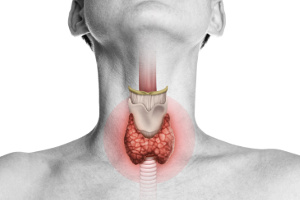
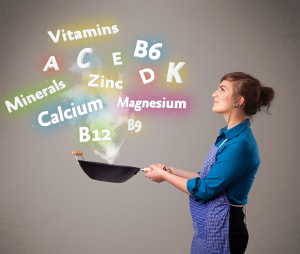 In ancient times when our ancestors hunted, they consumed every inch of the animal – from one end to another. Organ meat such as the liver, the heart, and the kidneys were delicacies that contained far more essential nutrients than other parts of the animal. In Western countries, we primarily consume muscle meat. In addition, animals often get unnatural fodder with suboptimal nutrient content. This results in deficiencies and an imbalance between amino acids and fatty acids. In the following article, you can read more about organ meats (also known as offal), bone marrow, and bone broth and their high content of essential amino acids, vitamin B12, iron, selenium, Q10, calcium, magnesium, collagen, glucosamine, CLA, and other vital nutrients. Also, you can read more about why it makes sense to choose meat from free-range livestock.
In ancient times when our ancestors hunted, they consumed every inch of the animal – from one end to another. Organ meat such as the liver, the heart, and the kidneys were delicacies that contained far more essential nutrients than other parts of the animal. In Western countries, we primarily consume muscle meat. In addition, animals often get unnatural fodder with suboptimal nutrient content. This results in deficiencies and an imbalance between amino acids and fatty acids. In the following article, you can read more about organ meats (also known as offal), bone marrow, and bone broth and their high content of essential amino acids, vitamin B12, iron, selenium, Q10, calcium, magnesium, collagen, glucosamine, CLA, and other vital nutrients. Also, you can read more about why it makes sense to choose meat from free-range livestock.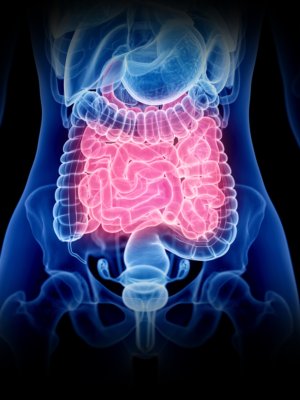 People with celiac disease are hyper-sensitive towards gluten, which we get from wheat and other grains. Gluten triggers inflammatory processes in the mucosa of the small intestine, impairing the uptake of nutrients. At the time of being diagnosed with the condition, people are often severely deficient in vitamin B12, vitamin D, folic acid, zinc, and copper. That problem should be addressed, according to a large study from the Mayo Clinic, a large, non-profit medical center based in Minnesota, USA. A growing number of people are affected by celiac disease that is linked to digestive problems plus other symptoms that are often misdiagnosed because the patient lacks vital nutrients. In this article, you can read about the difference between celiac disease and other types of gluten intolerance and find out how to deal with the problem.
People with celiac disease are hyper-sensitive towards gluten, which we get from wheat and other grains. Gluten triggers inflammatory processes in the mucosa of the small intestine, impairing the uptake of nutrients. At the time of being diagnosed with the condition, people are often severely deficient in vitamin B12, vitamin D, folic acid, zinc, and copper. That problem should be addressed, according to a large study from the Mayo Clinic, a large, non-profit medical center based in Minnesota, USA. A growing number of people are affected by celiac disease that is linked to digestive problems plus other symptoms that are often misdiagnosed because the patient lacks vital nutrients. In this article, you can read about the difference between celiac disease and other types of gluten intolerance and find out how to deal with the problem. Several studies have revealed that B vitamins strengthen the nervous system and reduce symptoms of stress. However, very few studies have looked at how the individual B vitamins work. A new placebo-controlled study that is published in the science journal, Human Psychopharmacology, appears to show that high-dosed vitamin B6 boosts the body’s formation of a certain neurotransmitter that blocks the exchange of undesirable impulses between brain cells, and this has a calming effect. In addition, vitamin B6 seems to reduce symptoms of depression
Several studies have revealed that B vitamins strengthen the nervous system and reduce symptoms of stress. However, very few studies have looked at how the individual B vitamins work. A new placebo-controlled study that is published in the science journal, Human Psychopharmacology, appears to show that high-dosed vitamin B6 boosts the body’s formation of a certain neurotransmitter that blocks the exchange of undesirable impulses between brain cells, and this has a calming effect. In addition, vitamin B6 seems to reduce symptoms of depression Sales of plant-based meat, also known as meat analogue, has increased for environmental reasons and a number of other reasons. However, even if meat analogue does resemble regular animal meat it has an entirely different nutritional value. According to a study from Duke University in the United States, real meat contains 22 different nutrients and metabolites that you do not get from meat analogue. On the other hand, meat based on vegetarian sources contains 31 nutrients and metabolites that are not found in normal meat. The largest difference between the two, according to the scientists, lies in their content of amino acids, peptides, vitamins, phenols, and fatty acids. The researchers also mention that a diet based on vegetable and animal products is complementary because it contains more nutrients.
Sales of plant-based meat, also known as meat analogue, has increased for environmental reasons and a number of other reasons. However, even if meat analogue does resemble regular animal meat it has an entirely different nutritional value. According to a study from Duke University in the United States, real meat contains 22 different nutrients and metabolites that you do not get from meat analogue. On the other hand, meat based on vegetarian sources contains 31 nutrients and metabolites that are not found in normal meat. The largest difference between the two, according to the scientists, lies in their content of amino acids, peptides, vitamins, phenols, and fatty acids. The researchers also mention that a diet based on vegetable and animal products is complementary because it contains more nutrients. People suffering from the Crohn’s disease, an inflammatory bowel disorder, often lack folic acid and vitamin B12. It is also known that this disease can be triggered by an infection with Mycobacterium avium subspecies paratuberculosis (MAP), a type of bacteria that can survives in pasteurized milk. A new study that is published in Nutrients has found why lack of folic acid and vitamin B12 disrupts the immune defense, thereby contributing to chronic inflammation that can occur in the wake of an infection with MAP.
People suffering from the Crohn’s disease, an inflammatory bowel disorder, often lack folic acid and vitamin B12. It is also known that this disease can be triggered by an infection with Mycobacterium avium subspecies paratuberculosis (MAP), a type of bacteria that can survives in pasteurized milk. A new study that is published in Nutrients has found why lack of folic acid and vitamin B12 disrupts the immune defense, thereby contributing to chronic inflammation that can occur in the wake of an infection with MAP.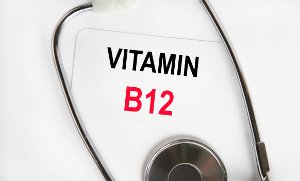 Vitamin B12 is only found in animal sources, which is why vegetarians and vegans risk getting too little. If children lack vitamin B12 it may result in underdeveloped motor skills and anemia, according to a study from Burkina Faso that is conducted in collaboration with the University of Copenhagen and Doctors Without Borders (Médecins sans Frontières). The scientists point out that vitamin B12 deficiencies are a big and overlooked problem and that normal B12 supplements are often not enough so new solutions are required.
Vitamin B12 is only found in animal sources, which is why vegetarians and vegans risk getting too little. If children lack vitamin B12 it may result in underdeveloped motor skills and anemia, according to a study from Burkina Faso that is conducted in collaboration with the University of Copenhagen and Doctors Without Borders (Médecins sans Frontières). The scientists point out that vitamin B12 deficiencies are a big and overlooked problem and that normal B12 supplements are often not enough so new solutions are required. Many women gain weight during pregnancy and have great difficulty with losing the excess pounds afterwards. According to a new study that was presented at an international endocrinology conference, a possible explanation may be lack of vitamin B12, which is a nutrient that helps the body metabolize fat. The researchers therefore suggest that it may be a good idea to take a vitamin B12 supplement during pregnancy, as overweight may eventually lead to health problems such as type 2 diabetes. There can also be emotional consequences of being overweight.
Many women gain weight during pregnancy and have great difficulty with losing the excess pounds afterwards. According to a new study that was presented at an international endocrinology conference, a possible explanation may be lack of vitamin B12, which is a nutrient that helps the body metabolize fat. The researchers therefore suggest that it may be a good idea to take a vitamin B12 supplement during pregnancy, as overweight may eventually lead to health problems such as type 2 diabetes. There can also be emotional consequences of being overweight.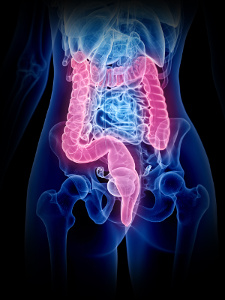 The most common inflammatory bowel diseases are Crohn’s disease and ulcerative colitis. Lack of certain nutrients can contribute to the development of these conditions. On the other hand, the diseases and the therapies used to treat them may also impair the body’s ability to absorb or utilize certain nutrients, thereby starting a vicious cycle that can make the disease worse. This was demonstrated in a new Greek study that is published in Nutrients. Chronic inflammatory bowel diseases primarily occur in the Western countries and especially at northern latitudes, which suggests that sun exposure and typically Western diets pay a major role in the development of these diseases.
The most common inflammatory bowel diseases are Crohn’s disease and ulcerative colitis. Lack of certain nutrients can contribute to the development of these conditions. On the other hand, the diseases and the therapies used to treat them may also impair the body’s ability to absorb or utilize certain nutrients, thereby starting a vicious cycle that can make the disease worse. This was demonstrated in a new Greek study that is published in Nutrients. Chronic inflammatory bowel diseases primarily occur in the Western countries and especially at northern latitudes, which suggests that sun exposure and typically Western diets pay a major role in the development of these diseases. Global heating and the whole climate debate have greatly increased the number of vegans and vegetarians. Their intensions may be good, but what they do not know is that their lifestyle can lead to serious health problems. A Spanish study of vegetarians and vegans has shown that 11% of the study participants had subclinical or clinical vitamin B12 deficiency. Earlier studies supporting this finding. Because the problem is insidious, it is often difficult to see the link between the deficiency and the symptoms caused by anemia or disturbances in the nervous system. The lack of vitamin B12 may also increase the risk of impaired fertility and development disturbances in the fetus. It is therefore a good idea for vegans and vegetarians to take a vitamin B12 supplement.
Global heating and the whole climate debate have greatly increased the number of vegans and vegetarians. Their intensions may be good, but what they do not know is that their lifestyle can lead to serious health problems. A Spanish study of vegetarians and vegans has shown that 11% of the study participants had subclinical or clinical vitamin B12 deficiency. Earlier studies supporting this finding. Because the problem is insidious, it is often difficult to see the link between the deficiency and the symptoms caused by anemia or disturbances in the nervous system. The lack of vitamin B12 may also increase the risk of impaired fertility and development disturbances in the fetus. It is therefore a good idea for vegans and vegetarians to take a vitamin B12 supplement.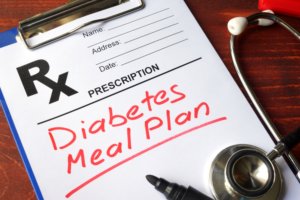 Diabetes is spreading with epidemic proportions, and an alarmingly high number of people are affected by metabolic syndrome, an early stage of diabetes that causes insulin resistance, elevated cholesterol, hypertension, and enlarged waist circumference. Ever since the 1970s, diabetics have been advised to stick with a low-fat diet consisting of bread, potatoes, and other carbohydrate sources. However, a new Danish study reveals that it is best to cut back on your carbohydrate intake. The new message to diabetics supports research from other parts of the world. Diabetics and people with sensitive blood sugar should focus on eating a diet with fewer carbohydrates, more protein, and more healthy fats. They should also make sure to get enough chromium, vitamin D, and magnesium, all of which are nutrients that support the body’s blood sugar levels. Furthermore, vitamin B12 and Q10 are important for those, who take diabetes medication and cholesterol-lowering drugs (statins).
Diabetes is spreading with epidemic proportions, and an alarmingly high number of people are affected by metabolic syndrome, an early stage of diabetes that causes insulin resistance, elevated cholesterol, hypertension, and enlarged waist circumference. Ever since the 1970s, diabetics have been advised to stick with a low-fat diet consisting of bread, potatoes, and other carbohydrate sources. However, a new Danish study reveals that it is best to cut back on your carbohydrate intake. The new message to diabetics supports research from other parts of the world. Diabetics and people with sensitive blood sugar should focus on eating a diet with fewer carbohydrates, more protein, and more healthy fats. They should also make sure to get enough chromium, vitamin D, and magnesium, all of which are nutrients that support the body’s blood sugar levels. Furthermore, vitamin B12 and Q10 are important for those, who take diabetes medication and cholesterol-lowering drugs (statins).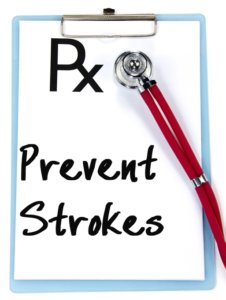 The whole climate debate has made it increasingly popular to become a vegetarian or a vegan. However, according to a new and comprehensive study from Oxford, this choice of lifestyle may have grave health consequences and can increase your risk of apoplexy, also known as stroke, cerebral hemorrhage or cerebral thrombosis. The study is published in British Medical Journal. Earlier studies also give rise to concern, as a plant-based diet often lacks protein, vitamin D, vitamin B12, iodine, selenium, iron, and omega-3 fatty acids, and that can increase the risk of thyroid disorders, neurological disorders, infections, chronic inflammation, impaired fertility, growth disturbances in children etc. Some of these deficiencies are insidious and difficult to link to the diet.
The whole climate debate has made it increasingly popular to become a vegetarian or a vegan. However, according to a new and comprehensive study from Oxford, this choice of lifestyle may have grave health consequences and can increase your risk of apoplexy, also known as stroke, cerebral hemorrhage or cerebral thrombosis. The study is published in British Medical Journal. Earlier studies also give rise to concern, as a plant-based diet often lacks protein, vitamin D, vitamin B12, iodine, selenium, iron, and omega-3 fatty acids, and that can increase the risk of thyroid disorders, neurological disorders, infections, chronic inflammation, impaired fertility, growth disturbances in children etc. Some of these deficiencies are insidious and difficult to link to the diet. Metabolic syndrome, which is an early stage of diabetes, is spreading like a bushfire. This condition is characterized by overweight, hypertension, hypercholesterolemia, and disrupted blood sugar metabolism. The diet plays a major role, and scientists have found a direct link between the intake and serum levels of vitamin B6, folic acid (vitamin B9), and vitamin B12, according to a large American population study that is published in JAMA Network Open. The authors also address how these B vitamins can help improve the glucose metabolism and prevent metabolic syndrome.
Metabolic syndrome, which is an early stage of diabetes, is spreading like a bushfire. This condition is characterized by overweight, hypertension, hypercholesterolemia, and disrupted blood sugar metabolism. The diet plays a major role, and scientists have found a direct link between the intake and serum levels of vitamin B6, folic acid (vitamin B9), and vitamin B12, according to a large American population study that is published in JAMA Network Open. The authors also address how these B vitamins can help improve the glucose metabolism and prevent metabolic syndrome.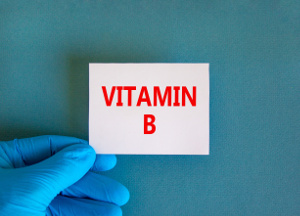
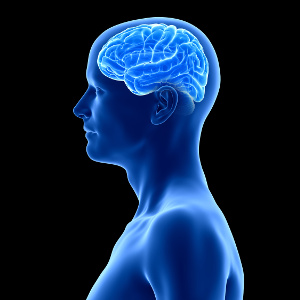 Glioblastoma is a the most common type of brain tumor and is very aggressive. Existing therapies are not all that effective and most people die within a few years after being diagnosed with the disease. It is essential to have more focus on prevention, and diet plays a major role. According to a Chinese population study, vitamins B1, B2, B2, and B9 (folic acid) are associated with a reduced risk of developing glioblastoma. The scientists mention the different B vitamins and their role in brain health and cancer prevention and stress the importance of knowing about the factors that inhibit the body’s uptake and utilization of these vitamins.
Glioblastoma is a the most common type of brain tumor and is very aggressive. Existing therapies are not all that effective and most people die within a few years after being diagnosed with the disease. It is essential to have more focus on prevention, and diet plays a major role. According to a Chinese population study, vitamins B1, B2, B2, and B9 (folic acid) are associated with a reduced risk of developing glioblastoma. The scientists mention the different B vitamins and their role in brain health and cancer prevention and stress the importance of knowing about the factors that inhibit the body’s uptake and utilization of these vitamins.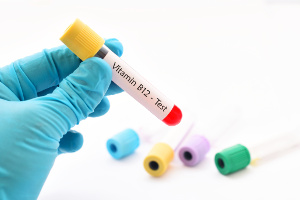 The number of seniors worldwide is increasing and more and more are affected by Alzheimer’s disease, the leading cause of dementia. We should therefore focus much more on this health problem that comes with an enormous human and socio-economic price tag. According to a new meta-analysis, supplementation with B vitamins appears to prevent or delay mild cognitive impairment in older people, which is normally an early sign of Alzheimer’s disease. In fact, supplementation with B vitamins may even represent an inexpensive therapy form with a huge potential.
The number of seniors worldwide is increasing and more and more are affected by Alzheimer’s disease, the leading cause of dementia. We should therefore focus much more on this health problem that comes with an enormous human and socio-economic price tag. According to a new meta-analysis, supplementation with B vitamins appears to prevent or delay mild cognitive impairment in older people, which is normally an early sign of Alzheimer’s disease. In fact, supplementation with B vitamins may even represent an inexpensive therapy form with a huge potential.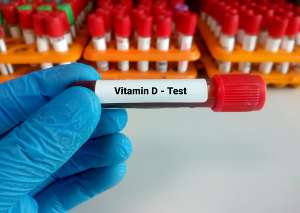 Many people unwittingly suffer from a disease called non-alcoholic fatty liver disease, which is related to overweight and diabetes. The diet plays a major role, and a Chinese study shows that vitamin B12 is of particular importance. The scientists believe that the body’s vitamin B12 metabolism holds a therapeutic potential in relation to detecting and treating the disease and the complications that follow in the wake of it.
Many people unwittingly suffer from a disease called non-alcoholic fatty liver disease, which is related to overweight and diabetes. The diet plays a major role, and a Chinese study shows that vitamin B12 is of particular importance. The scientists believe that the body’s vitamin B12 metabolism holds a therapeutic potential in relation to detecting and treating the disease and the complications that follow in the wake of it.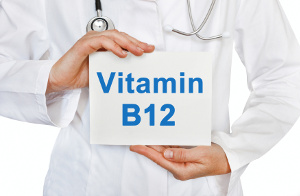
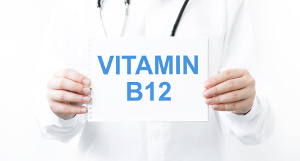 Vitamin B12 is important for the development and function of our central nervous system. In the past decades, science has also found similarities between sclerosis and the neurological symptoms that occur in people who lack vitamin B12. In a new study that is published in Cell Reports, scientists have found the molecular relation between vitamin B12 and the function of supportive brain cells.
Vitamin B12 is important for the development and function of our central nervous system. In the past decades, science has also found similarities between sclerosis and the neurological symptoms that occur in people who lack vitamin B12. In a new study that is published in Cell Reports, scientists have found the molecular relation between vitamin B12 and the function of supportive brain cells.
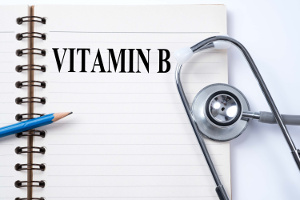 Non-alcoholic fatty liver disease (NAFLD) is an insidious disease that is spreading like a bushfire, and it is typically seen in connection with overweight. Many people with the disease develop a type of liver inflammation and scarring that can be potentially life-threatening. According to a study that is published in Journal of Hepatology, supplementation with vitamin B12 and folic acid (vitamin B9) can counteract the development of inflammation and scarring by lowering levels of the amino acid homocysteine. The scientists behind the study looked closer at homocysteine’s role in the pathogenicity of the disease.
Non-alcoholic fatty liver disease (NAFLD) is an insidious disease that is spreading like a bushfire, and it is typically seen in connection with overweight. Many people with the disease develop a type of liver inflammation and scarring that can be potentially life-threatening. According to a study that is published in Journal of Hepatology, supplementation with vitamin B12 and folic acid (vitamin B9) can counteract the development of inflammation and scarring by lowering levels of the amino acid homocysteine. The scientists behind the study looked closer at homocysteine’s role in the pathogenicity of the disease. More and more people in the Western world shift to a plant-based diet but may find themselves challenged when it comes to getting enough of certain essential nutrients. A new German study shows that most vegetarians and vegans get enough vitamin B12, provided they take supplements. However, many lack iodine and iron. Also, plant-based diet fails to deliver enough vitamin D, and many lack selenium due to the nutrient-depleted farmland. A lot of deficiency diseases are insidious, which makes it difficult to link them to the diet. It is therefore a good idea for children and adults who are vegetarians or vegans to take relevant supplements.
More and more people in the Western world shift to a plant-based diet but may find themselves challenged when it comes to getting enough of certain essential nutrients. A new German study shows that most vegetarians and vegans get enough vitamin B12, provided they take supplements. However, many lack iodine and iron. Also, plant-based diet fails to deliver enough vitamin D, and many lack selenium due to the nutrient-depleted farmland. A lot of deficiency diseases are insidious, which makes it difficult to link them to the diet. It is therefore a good idea for children and adults who are vegetarians or vegans to take relevant supplements.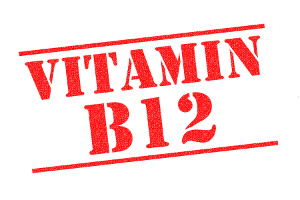 Neuropathic pain is caused by disease or damage in the somatosensory nervous system. According to a new review article that is published in the scientific journal Nutrients, it seems that therapy with vitamin B12 may have a positive effect on this type of pain. It also appears that vitamin B12 deficiency is rather common in people with diabetic neuropathy, which is a serious complication that may result in amputation in worst case. Therefore, it is vital that diabetics make sure to get enough vitamin B12. Patients with pain caused by peripheral neuropathy may also consider taking the other B vitamins and vitamin D.
Neuropathic pain is caused by disease or damage in the somatosensory nervous system. According to a new review article that is published in the scientific journal Nutrients, it seems that therapy with vitamin B12 may have a positive effect on this type of pain. It also appears that vitamin B12 deficiency is rather common in people with diabetic neuropathy, which is a serious complication that may result in amputation in worst case. Therefore, it is vital that diabetics make sure to get enough vitamin B12. Patients with pain caused by peripheral neuropathy may also consider taking the other B vitamins and vitamin D.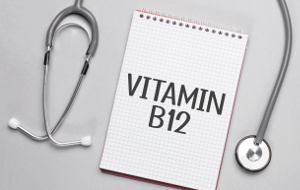
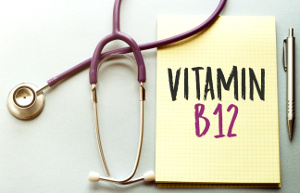 Lack of vitamin B12 is known to cause fatigue, poor memory, cognitive impairment, and hippocampal atrophy. Supplementation with B12, on the other hand, can improve cognitive functions, according to a study that is published in Nutrients. The problem is that the signs of cognitive disturbance are insidious and therefore not automatically associated with a simple nutrient deficiency that is often a result of ageing, vegetarian diets, low stomach acid, or diabetes medication.
Lack of vitamin B12 is known to cause fatigue, poor memory, cognitive impairment, and hippocampal atrophy. Supplementation with B12, on the other hand, can improve cognitive functions, according to a study that is published in Nutrients. The problem is that the signs of cognitive disturbance are insidious and therefore not automatically associated with a simple nutrient deficiency that is often a result of ageing, vegetarian diets, low stomach acid, or diabetes medication. Deficiencies of vitamin B12 are widespread due to plant-based diets, aging processes, poor absorption, and certain types of medication. A B12 deficiency can cause anemia, fatigue, poor memory, infections, reduced fertility, impotence, and neurological diseases such as neuropathy, according to an article published in Cureus.
Deficiencies of vitamin B12 are widespread due to plant-based diets, aging processes, poor absorption, and certain types of medication. A B12 deficiency can cause anemia, fatigue, poor memory, infections, reduced fertility, impotence, and neurological diseases such as neuropathy, according to an article published in Cureus.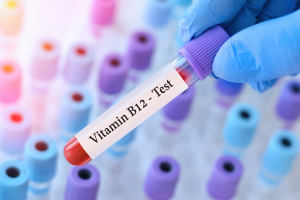
 Parkinson’s patients have less vitamin B3 in their blood due to interactions with medicine and certain other factors. Vitamin B3 is important for our energy turnover and some of the symptoms of Parkinson’s disease may be caused by lack of B3. On the other hand, vitamin B3 supplements can help by reducing fatigue, improving handwriting, and improving your mood, according to a study that is published in Frontiers of Aging Neuroscience. The scientists assume that giving supplements of vitamin B3 to patients with Parkinson’s disease has the potential to improve quality of life and delay the progression of their disease.
Parkinson’s patients have less vitamin B3 in their blood due to interactions with medicine and certain other factors. Vitamin B3 is important for our energy turnover and some of the symptoms of Parkinson’s disease may be caused by lack of B3. On the other hand, vitamin B3 supplements can help by reducing fatigue, improving handwriting, and improving your mood, according to a study that is published in Frontiers of Aging Neuroscience. The scientists assume that giving supplements of vitamin B3 to patients with Parkinson’s disease has the potential to improve quality of life and delay the progression of their disease.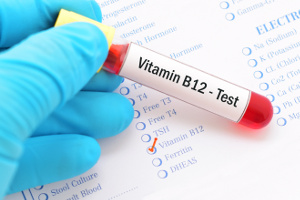 Vitamin B12 is required for the production of red blood cells, and the importance of the nutrient for the nervous system is often overlooked. Factors like vegan diets, ageing processes, low stomach acid, and use of anti-diabetic medication increase the risk of a vitamin B12 deficiency. Pernicious anemia is a life-threatening autoimmune disease where people are unable to absorb vitamin B12 from their diet. Typical symptoms of the condition are fatigue, poor memory, nerve damage, impaired fertility etc. and because these problems are insidious, it may be difficult to link them to the root cause. Many people are misdiagnosed as being stressed or having dementia. However, according to an article published in MedicalNewsToday, it may have detrimental consequences for your health if the vitamin B12 deficiency is not treated in ample time.
Vitamin B12 is required for the production of red blood cells, and the importance of the nutrient for the nervous system is often overlooked. Factors like vegan diets, ageing processes, low stomach acid, and use of anti-diabetic medication increase the risk of a vitamin B12 deficiency. Pernicious anemia is a life-threatening autoimmune disease where people are unable to absorb vitamin B12 from their diet. Typical symptoms of the condition are fatigue, poor memory, nerve damage, impaired fertility etc. and because these problems are insidious, it may be difficult to link them to the root cause. Many people are misdiagnosed as being stressed or having dementia. However, according to an article published in MedicalNewsToday, it may have detrimental consequences for your health if the vitamin B12 deficiency is not treated in ample time. "After about one week of taking the Q10 supplement I could feel a huge difference," says 23-year old Alan Piccini, who has been suffering from extreme fatigue and muscle aches ever since he was a child.
"After about one week of taking the Q10 supplement I could feel a huge difference," says 23-year old Alan Piccini, who has been suffering from extreme fatigue and muscle aches ever since he was a child. “Taking capsules with co-enzyme Q10 has freed me of the severe side effects of my cholesterol lowering medicine,” Mrs Franken explains.
“Taking capsules with co-enzyme Q10 has freed me of the severe side effects of my cholesterol lowering medicine,” Mrs Franken explains.